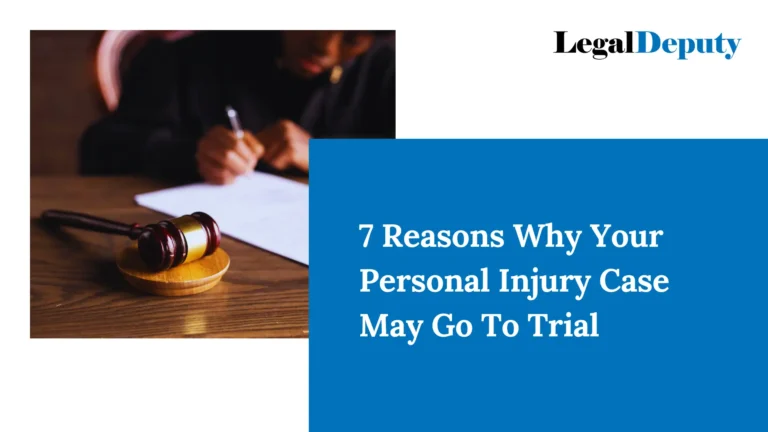Will My Family Members Be Deposed In My Personal Injury Case?
When you’re involved in a personal injury case, there are many legal processes that may seem confusing or overwhelming. One question that often comes up is whether your family members will need to be deposed as part of your case. Understanding what depositions are and how they may affect your loved ones is essential to navigating your personal injury claim.
In this blog, we’ll break down what a deposition is, when your family members might be involved, what happens during a deposition, and how to prepare for it. We’ll also discuss how depositions impact your personal injury case and offer tips for handling the emotional stress that might come with it.
What is a Deposition?
A deposition is a formal, out-of-court interview that is part of the discovery process in a legal case. During discovery, both sides gather information to support their arguments, and depositions allow lawyers to ask questions of witnesses under oath. The purpose is to get a clear understanding of the facts, including your injuries, how they affect your life, and how the accident occurred.
Depositions take place before trial, usually in a lawyer’s office, and are recorded by a court reporter. Both sides’ attorneys will be present, and the person being deposed will answer questions under oath. These answers can be used in court later if necessary.
Can Family Members Be Deposed?
The short answer is yes, your family members can be deposed in your personal injury case, but whether or not they actually will be depends on the specifics of your case.
In personal injury cases, family members can provide valuable insight into:
- The extent of your injuries: They can speak to how your injuries have affected your day-to-day life.
- Emotional and psychological impact: They may describe any emotional distress you’ve experienced and how it has changed your demeanor.
- Support and care: If a family member has been caring for you since your injury, they can provide testimony on the physical and emotional strain caused by the injury.
- Accident details: In some cases, family members may have witnessed the accident itself or the immediate aftermath and can share their version of events.
Family members like your spouse, children, or parents may be called to give depositions if their testimony is relevant to your case. However, they’re usually only deposed if their information is directly related to your injuries or the damages being claimed.
Want a Free Consultation?

Why Would My Family Members Be Deposed?
The defense team in a personal injury case may want to depose your family members to verify details about your injury and assess the credibility of your claims. By hearing from those closest to you, they can cross-check the information you’ve provided.
Common reasons family members might be deposed include:
Financial impact on the family: In some cases, depositions are used to understand how the injury has affected the family’s financial situation. If your spouse or partner has had to miss work to care for you, or if your injury has led to lost household income, this can play a role in the overall damages being claimed.
Corroborating your claims: For instance, if you claim that you’re unable to perform certain tasks due to your injury, your spouse or child may be asked to confirm whether or not you truly struggle with those activities.
Understanding the emotional toll: Family members can testify about how your injuries have affected your mood, behavior, and overall well-being. For example, they might be asked to explain if you have been more irritable, depressed, or unable to participate in family events.
What Happens During a Family Member’s Deposition?
If your family members are deposed, they will be asked a series of questions by the opposing attorney, much like you would be during your own deposition. Here’s what typically happens:
- Preliminary Questions: These include basic personal information, such as their name, occupation, relationship to you, and other identifying details.
- Questions About the Accident: They may be asked what they know about the incident, whether they witnessed it, and how they learned about it.
- Impact on Your Life: The attorney may focus on how your injury has impacted your daily activities, emotions, and ability to function. For example, they might ask your spouse to explain any limitations you have with household chores, socializing, or physical activities since the accident.
- Questions About Emotional and Psychological Effects: Your family members might be asked how your injury has affected your relationships or mental health. The attorney might explore whether you’ve become withdrawn, depressed, anxious, or irritable.
- Financial or Caretaking Roles: If your family member has taken on additional responsibilities, such as caring for you or handling financial matters, they may be asked to describe these new duties.
It’s important to remember that depositions are taken under oath, so your family members must answer truthfully. While the process can feel intimidating, they are not meant to “trap” anyone. Depositions simply allow both sides to gather facts before going to trial.
How to Prepare Your Family Members for a Deposition
Preparing your family members for a deposition can help ensure that they feel more comfortable and are able to answer questions confidently. Here are some tips to guide them:
Practice with a lawyer: Your attorney may offer to sit down with your family members and go over potential questions. This practice can help them feel more at ease during the actual deposition.
Explain the process: Make sure they understand what a deposition is and that it’s part of the legal process. This will help alleviate some anxiety about being questioned by lawyers.
Encourage honest and clear answers: Your family members should know that it’s important to answer each question truthfully, but also to avoid speculation. If they don’t know the answer to something, they can simply say, “I don’t know.”
Review important details: Go over key facts about your injury, such as when the accident occurred, what your diagnosis was, and how it has affected your life. This will refresh their memory and help them provide accurate answers.
The Emotional Side of a Deposition
It’s not uncommon for depositions to feel stressful, especially when family members are involved. Talking about the pain and emotional strain caused by your injury can be difficult for loved ones, and the thought of being questioned by lawyers may make them nervous.
Let your family members know that it’s okay to feel emotional, but they should remain calm and composed during their deposition. If they need to take a break, they can ask to pause at any time. It’s also helpful to remind them that their role is simply to share the truth about what they’ve witnessed, and nothing more.
How Depositions Affect Your Case
Depositions are a key part of the discovery process and can greatly influence how a personal injury case unfolds. If your family members provide clear, consistent testimony that aligns with your claims, it can strengthen your case. On the other hand, inconsistencies or conflicting statements could hurt your credibility.
That’s why preparing for depositions is so important. Having your family’s support and testimony can give you a powerful advantage, but it’s essential that their accounts are accurate and reflect what you’ve already shared with your legal team.
Want a Free Consultation?
Conclusion
In a personal injury case, it’s possible that your family members may be deposed, especially if they have information that is relevant to your injuries or how the accident has affected your life. While this process may seem daunting, knowing what to expect and preparing for it can make it much easier to handle.
Encourage your family members to be honest and clear in their responses, and work with your attorney to ensure that everyone is prepared. With the right preparation, depositions can serve as a tool to reinforce your case and help you seek the compensation you deserve.
If you have further questions about depositions or your personal injury case, be sure to consult with your attorney for guidance.
FAQ Section
1. Can children be deposed in a personal injury case?
Yes, children can be deposed if they have relevant information about the case. However, their age, maturity, and ability to understand the questions are taken into consideration. In some cases, courts may limit or protect how children are questioned to prevent trauma or discomfort.
2. How long does a family member’s deposition typically last?
Depositions can vary in length depending on the complexity of the case and the amount of information needed. Typically, depositions last anywhere from a few hours to a full day. However, shorter depositions are more common for family members unless their testimony is critical.
3. Can I attend my family member’s deposition?
Yes, you are usually allowed to attend your family member’s deposition. However, it’s important to check with your attorney first, as some cases may involve confidentiality agreements that prevent parties from being present at certain depositions.
4. Can a family member refuse to be deposed?
In most cases, family members cannot refuse to be deposed if they’ve been subpoenaed (legally required to attend). If they fail to appear after being subpoenaed, they may face legal consequences such as fines or penalties. If they have concerns, it’s best to consult your attorney.
5. What happens if a family member makes a mistake during their deposition?
If a family member provides incorrect or unclear information, they can clarify or correct their statement during the deposition. Additionally, after reviewing the deposition transcript, your attorney may file corrections within a certain period. However, it’s important for family members to stay truthful and avoid guessing or speculating.
6. Are depositions recorded on video?
Depositions are typically recorded by a court reporter, who transcribes the conversation into a written transcript. In some cases, video depositions may be used, especially if a witness might not be available to testify at trial. Your attorney can advise whether video recording is likely in your case.
7. Can family members have their own lawyer present at their deposition?
Yes, family members can bring their own attorney to a deposition, especially if they feel uncomfortable or uncertain. However, in most personal injury cases, the attorney representing you may also guide and support your family members during their depositions.
8. Can family members refuse to answer specific questions during a deposition?
Family members may refuse to answer certain questions if they believe the questions are irrelevant, invasive, or violate their legal rights. However, objections are generally handled by the attorneys present. It’s best for them to answer most questions unless instructed otherwise by legal counsel.
Disclaimer:
The information provided in this blog, “Will My Family Members Be Deposed In My Personal Injury Case?”, is intended for general informational purposes only and does not constitute legal advice. While we strive to provide accurate and up-to-date information, the content of this blog may not reflect the most current legal developments or interpretations.
Readers should not act or refrain from acting based on the information contained herein without seeking appropriate legal or other professional advice on the specific facts and circumstances at issue from a licensed attorney in the relevant jurisdiction. This blog is not intended to create, and receipt of it does not constitute, an attorney-client relationship between the reader and the author or the author’s affiliated organization.
All liability with respect to actions taken or not taken based on the contents of this blog is expressly disclaimed. The information is provided “as is”; no representations are made that the content is error-free.
For specific legal advice regarding your personal injury case or any other legal matters, please consult with a qualified legal professional.







